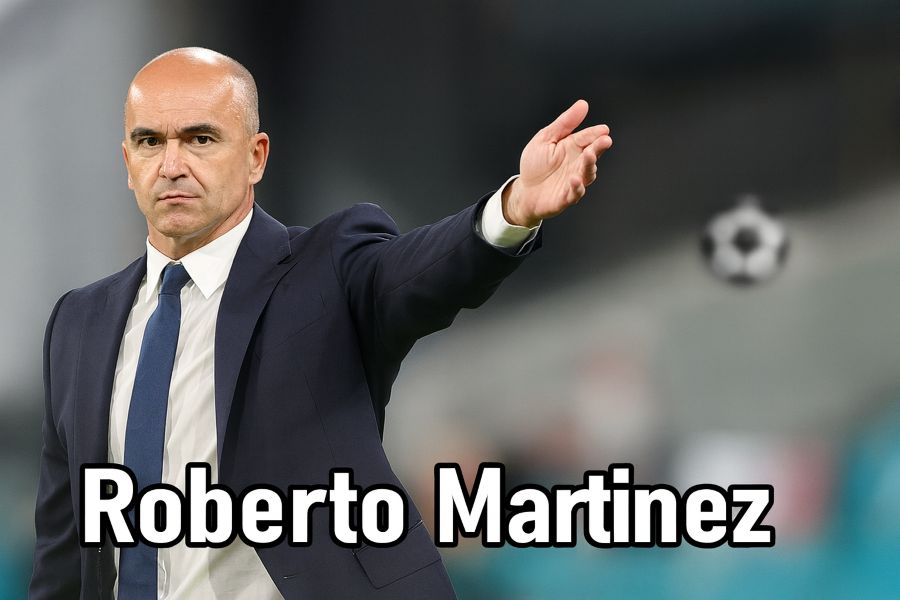Roberto Martínez – The Visionary Spanish Football Manager Redefining Global Coaching
From Balaguer to the World Stage: The Inspiring Rise of Portugal’s Mastermind Strategist

Introduction
Roberto Martínez stands among the most influential and intelligent minds in modern football. A proud Spanish football manager, former player, and tactical innovator, Martínez has transformed every team he has led — from humble beginnings at Swansea City to managing global stars under the flags of Belgium and Portugal. His journey is a blend of success, resilience, and reinvention, demonstrating that strategy and philosophy can change the very DNA of football teams.
Born in Catalonia, Spain, Martínez’s rise in the world of football management has been marked by both triumphs and challenges. His methods — built on possession, structure, and creativity — have inspired generations of coaches and players. Whether winning the FA Cup with underdogs Wigan Athletic or guiding Belgium to their best-ever World Cup finish, his leadership has consistently blended elegance with intelligence.
Quick Bio
| Attribute | Details |
|---|---|
| Full Name | Roberto Martínez Montoliu |
| Date of Birth | 13 July 1973 |
| Age | 52 years (as of 2025) |
| Birthplace | Balaguer, Lleida, Catalonia, Spain |
| Nationality | Spanish |
| Profession | Football Manager, Former Professional Footballer |
| Current Role | Head Coach of Portugal National Team |
| Height | 1.78 meters (5 ft 10 in) |
| Education | Degree in Physiotherapy; Postgraduate Diploma in Business Management |
| Spouse | Beth Thomson |
| Children | Luella and Safiana |
Early Life and Education
Roberto Martínez was born on July 13, 1973, in Balaguer, Catalonia — a region renowned for its deep footballing roots. From an early age, he showcased an unshakable passion for the sport, joining his local club CF Balaguer at only nine years old. His natural leadership and understanding of the game soon caught the attention of Real Zaragoza, where he began to shape his professional ambitions.
Alongside his football journey, Martínez valued education deeply. He earned a degree in physiotherapy and later completed a postgraduate diploma in business management at Manchester Metropolitan University. This academic foundation shaped his analytical approach to football, setting him apart as a manager who blends athletic science with tactical innovation.
Playing Career: The Foundation of a Leader
Before becoming a world-renowned coach, Martínez built a respectable career as a professional footballer. Playing primarily as a defensive midfielder, he developed a deep understanding of game dynamics that would later define his coaching style.
He began his senior journey with Real Zaragoza, making his debut in Spain’s La Liga. His real breakthrough came after moving to England in 1995, where he joined Wigan Athletic. Known affectionately as one of “The Three Amigos,” Martínez became a cult hero, helping Wigan win the Football League Third Division title (1996–97) and the Football League Trophy (1998–99).
Later, he represented Motherwell, Walsall, Swansea City, and Chester City, leaving behind a legacy of professionalism and intelligence. During his time at Swansea, he served as captain and inspired promotion to League One — a preview of his leadership qualities to come.
The Start of a Managerial Revolution
Swansea City: A New Era Begins
In 2007, Martínez took over as manager of Swansea City, marking the start of his managerial revolution. Within a single season, he led the club to the League One title, earning promotion and transforming the team’s playing identity. His introduction of possession-based football — built around control, passing, and composure — laid the groundwork for what became known as “Swansea’s way.”
His vision didn’t just deliver results; it changed the club’s culture. Under his guidance, Swansea became a model for modern football in Britain, emphasizing technical excellence over brute force. His success also earned him the League One Manager of the Year award in 2008.
Wigan Athletic: The Miracle of the FA Cup
After proving his credentials at Swansea, Martínez returned to Wigan Athletic as manager in 2009. Facing financial limitations and relegation battles, he showcased his strategic brilliance by maintaining Wigan’s Premier League status year after year.
In 2013, he achieved what many considered impossible — guiding Wigan to their first-ever FA Cup victory, defeating Manchester City 1–0 at Wembley Stadium. It was a moment that defined his career: the triumph of intelligence, belief, and persistence over wealth and power. Though Wigan faced relegation shortly after, the FA Cup win cemented Martínez’s name in English football history.
Everton: Blending Passion with Premier League Power
In 2013, Martínez became the first non-British manager of Everton FC. His debut season was exceptional, guiding the team to a 5th-place Premier League finish — their highest in recent memory — and qualifying for European competition.
He emphasized fluid movement, tactical discipline, and attacking creativity. Despite later challenges and inconsistent results, his time at Everton showcased his ability to compete at the highest level while staying loyal to his philosophy.
Belgium National Team: Guiding a Golden Generation
In 2016, Martínez was appointed head coach of the Belgium national team, home to global stars such as Eden Hazard, Kevin De Bruyne, and Romelu Lukaku. Under his leadership, Belgium achieved their best-ever World Cup result, finishing third in the 2018 FIFA World Cup after defeating England in the playoff.
His Belgium side also reached the quarterfinals of Euro 2020 and held the #1 FIFA world ranking for several years. Martínez’s ability to manage egos, motivate superstars, and foster tactical harmony earned him immense respect across Europe.
Portugal National Team: The New Chapter
In 2023, Roberto Martínez began a new chapter as the head coach of Portugal, succeeding Fernando Santos. His arrival injected fresh energy into the team, blending young talent with seasoned legends like Cristiano Ronaldo.
Under his management, Portugal completed a perfect Euro 2024 qualifying campaign, winning all ten matches, scoring 36 goals, and conceding just two. In 2025, he led Portugal to victory in the UEFA Nations League, defeating Spain on penalties — a testament to his tactical sharpness and leadership.
Coaching Style and Philosophy
Martínez’s football philosophy combines possession, intelligence, and adaptability. Influenced by Johan Cruyff, he prioritizes building from the back, using the ball as a defensive tool, and creating fluid attacking patterns.
His coaching is built on trust, communication, and player empowerment. He encourages his teams to express creativity within a structured system — a blend that makes his sides both disciplined and unpredictable.
Conclusion
Roberto Martínez’s story is one of vision, perseverance, and evolution. From a young footballer in Catalonia to managing world-class teams, his journey reflects the power of belief and innovation. As a Spanish football manager, he has defied expectations, turning underdogs into champions and stars into unified teams.
Today, Martínez continues to inspire not only players but aspiring managers worldwide. His achievements — from Swansea’s rise to Wigan’s FA Cup miracle, Belgium’s global prominence, and Portugal’s resurgence — stand as a testament to his brilliance and relentless pursuit of excellence.
FAQs About Roberto Martínez
Q1: Who is Roberto Martínez?
A: Roberto Martínez is a Spanish football manager and former player, currently serving as head coach of the Portugal national team.
Q2: What is Roberto Martínez’s coaching philosophy?
A: He emphasizes possession-based football, tactical intelligence, and creativity inspired by Johan Cruyff’s philosophy.
Q3: What are his biggest achievements as a manager?
A: Winning the FA Cup with Wigan Athletic, leading Belgium to third place in the 2018 FIFA World Cup, and winning the UEFA Nations League with Portugal.
Q4: What was Martínez’s playing position?
A: He played as a defensive midfielder throughout his football career.
Q5: What makes Roberto Martínez unique as a coach?
A: His combination of academic knowledge, leadership, and football philosophy makes him one of the most respected and forward-thinking managers in the world.



